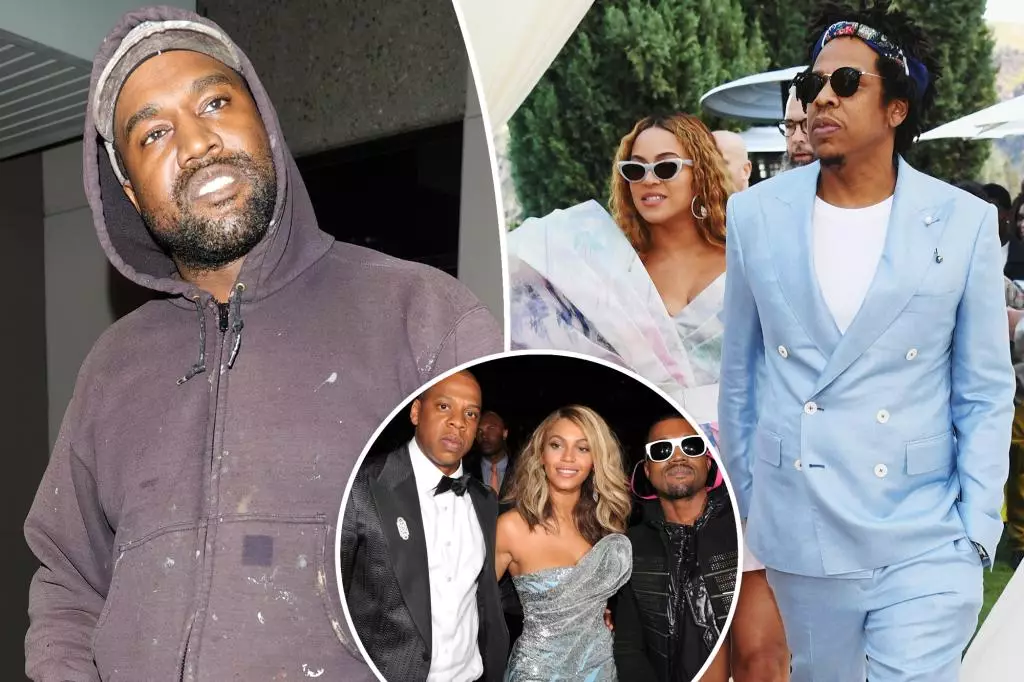Kanye West, the enigmatic figure of modern music and fashion, once again stirred the pot with his erratic online behavior. Following an inexplicable outburst targeting Beyoncé and Jay-Z’s young children, Sir and Rumi, West expressed public regret about his statements. His confession on Twitter—”I LOVE JAY Z AND I DO FEEL BAD”—highlights the complexities of his emotional landscape, illustrating the struggles of a man caught between brilliance and chaos. In a world that often craves authenticity, West’s public meltdowns serve both as a startling reminder of the pressures fame can exert and as a poignant exploration of his own deep-seated feelings of isolation and rejection.
Deep-Seated Grievances and Misplaced Loyalties
West’s emotional tirades often reflect a tempestuous blend of his personal experiences and his industry relationships. His feelings of being slighted by the Carters culminated from two major events: their absence at his wedding to Kim Kardashian and Jay-Z’s decision to feature Kendrick Lamar instead of him in the Super Bowl 2025 halftime show. These moments seemed to intensify an already fraught relationship, feeding West’s narrative of feeling like the ‘black sheep’ in the music industry. His yearning for camaraderie in a world where relationships can be transactional reveals a deeply human vulnerability. In many ways, his criticisms of Jay and Beyoncé seem to stem from an unmet desire for validation and support, particularly regarding his role as a father.
The Resulting Emotional Fallout
West’s statement that the Carters could have leveraged their cultural influence to support him paints a vivid picture of his perceived emotional abandonment. The explicit mention of his children—North, Saint, Chicago, and Psalm—underscores his struggles as a father against a backdrop of real and perceived slights. His declaration that “S–T HURTS SO F–K BOTH OF THEM” illustrates extreme emotional distress, suggesting a man overwhelmed not just by his current circumstances, but by the weight of familial and friendly expectations. This tumultuous feeling, compounded with the public nature of his rants, adds layers to his persona and often leaves audiences grappling for understanding.
Twitter: A Double-Edged Sword
In an era where social media can be both a platform for creativity and a breeding ground for scandal, West’s actions serve as a case study in the pitfalls of public expression. His impulsive messages—including his unsettling commentary on the mental capacity of the Carters’ children—are indicative of his struggles with self-control and the pressures of living in the spotlight. The fact that he deleted the tweet while claiming that his decision was motivated by a fear of losing his Twitter account (“because there was a possibility of my Twitter being cancelled”) underscores the precarious balance he maintains between expressing his truth and facing societal repercussions.
Relationships Fractured by Fame
The history between West and Jay-Z reveals a complex narrative layered with betrayal and affection. Once close friends and collaborators, their relationship began to fracture after an incident involving West’s family, specifically when Kim Kardashian was robbed in Paris. The fallout from that moment seems to have been a turning point, marking the decline of their friendship and the continued public scrutiny that both men faced. Jay-Z’s dissection of West’s troubled mindset in his album “4:44” reflects not only their strained friendship but also encapsulates the broader risks of fame—a world that can twist both blessings and curses into a dangerous cocktail of artistic expression and personal failure.
Social Media: The Modern Battleground
West’s conflict is further exacerbated by his engagements with other facets of the entertainment world, including ongoing disputes with figures like Sean “Diddy” Combs and Cassie Ventura. Such conflicts highlight the often volatile and transactional nature of modern celebrity culture, where personal grievances can quickly escalate into public feuds. With every tweet or Instagram post, artists like West navigate the fine line between personal expression and the potential backlash that can flood in from a worldwide audience.
In essence, Kanye West remains an enigma, a figure whose creative genius is often overshadowed by a tumultuous relationship with fame, friendship, and familial expectations. Each outburst invites scrutiny, but it also beckons for understanding—a desire for connection in a world that often prioritizes spectacle over substance.
